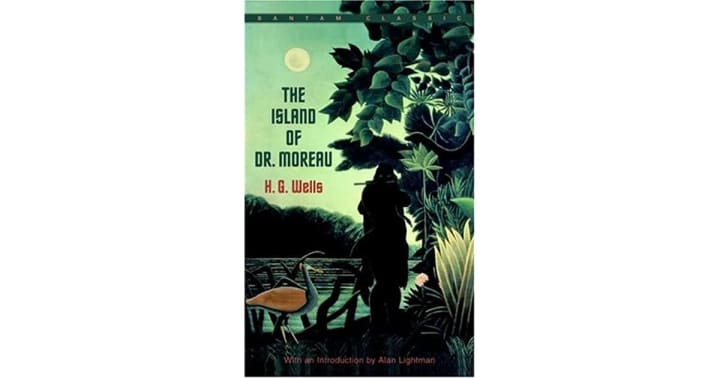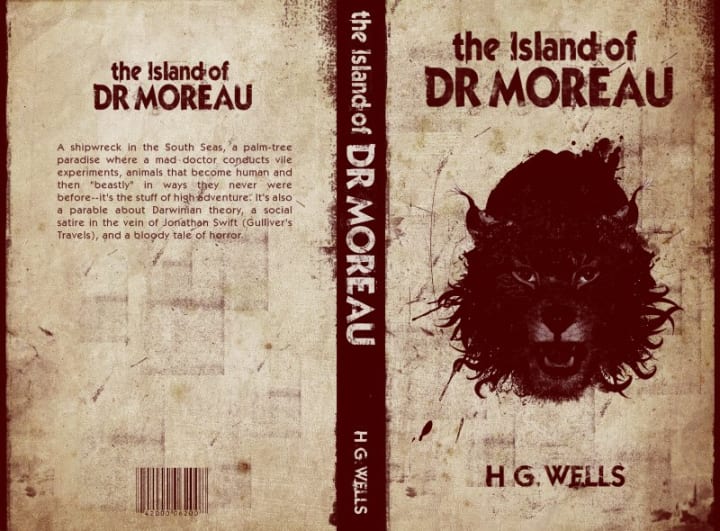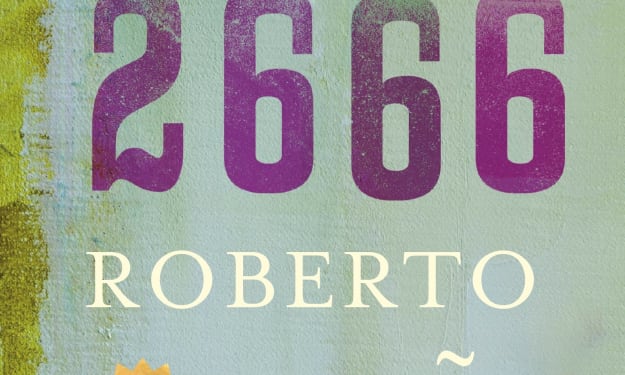"The Island of Dr. Moreau" by HG Wells
A Reading Experience (Pt.9)

The first time I read “The Island of Dr. Moreau” by HG Wells, I was possibly about twelve years’ old and really only read it because the cover looked really cool. It was pretty short and I asked myself how long it would really take me to finish and whether I could make it last the whole weekend because it was a Friday. I ended up taking two books home and the other one was ‘Heart of Darkness’ by Joseph Conrad, so I had a somewhat interesting weekend ahead of me. My first reading experience of Dr. Moreau was intense. I actually couldn’t put it down, I was scared I would miss something. I read it like it was the last book I was ever going to read. I was absolutely immersed in the story of Edward Prendick’s doomed journey. The book really did change my perspective on the fine line between adventure books and sci-fi/horror novels. There was a very fine line and I really couldn’t tell where this book was on it. Sometimes it felt like an adventure and other times it was absolutely terrifying.
My favourite character in the book was most probably Edward because he is the character that the reader most associates with and sees through the eyes of. Edward’s journey to the island happens by complete accident but when he does get there, he as one of the most humane (I use the term lightly) characters, seeks to do what he thinks is correct. What makes Edward such a great character to explore is his want to do something morally correct that clashes with his limitations on the island. There’s so much secrecy, he is told where he can and cannot go and what he can and cannot do. This is all told to him by Dr. Moreau, who seems to be not really a doctor who likes to cure people at all. Edward therefore both listens to the rules and manages to stay within his moral compass. However, when he starts breaking the rules and believes he has done something wrong - it is ironic that then and only then does he take any sort of morally good action against the wrongs of Dr. Moreau. Edward’s biggest fault, I believe, is his want to seem like a good person. At first, when Edward wants to seem agreeable, he makes good friends with Dr. Moreau and this delays everything that Edward should be doing in order to save the other people and animals on the island. It is his blindness towards Moreau’s experiments and his sheer want to seem like a good person to the man he takes as the leader of the island that delays his thoughts to take any action against the injustices and sheer violence of Moreau’s work. Edward represents what is quintessentially human, the animals represent what is animal and the experimental ones represent those that are in-between. Since Edward represents the human side, he has all the empathetic qualities of the human and therefore, this is why he must be the one to take action. What is really confusing is that we know that Edward is the quintessential human, but where does Dr. Moreau stand on all of this? We have little idea as to which side he leans towards in his actions and speeches. He seems to be neither.

A key theme of the book is the question of what is right and what is possible. This theme entails the work of Dr Moreau and makes the reader question his motives. When Dr. Moreau is making his creatures, he is utterly convinced that he is doing the correct thing in order to advance the nature of human science and to better the human race. However, the question of morality comes into it as whether this is a correct thing to do in terms of religion, ethics and humaneness. The answer to that question is ‘no’. But, then we get the side of evolution and how humans have evolved on their own over the years. If humans evolve then isn’t that just what Dr. Moreau is doing, just evolution is slowed down by a couple of thousand/million years? If it is Dr. Moreau that is doing something wrong then it would not rely on the fact that he is playing God by making humans evolve into more adaptable beings. It would be the fact that he is applying great amounts of speed to these mutations, he is fusing them with different species and animals with other animals. It would be the fact that he is applying an autocratic rule to his creations in which they have no say, opinions or beliefs other than in him as their leader. This theme is definitely used in order to make the reader believe that Dr. Moreau is playing God, whereas in fact he may be playing God, but his main function is to show us what scientific evolution looks like when we speed it up and what scientific evolution looks like when we put all of the power into the hands of the scientists and the scientists only. Wells was well aware of the consequences since he lived through the biggest technological advancement since the Renaissance.
This book means so much to me because not only have I read it many times, but I’ve also taught it quite a few times and it gets better and better with every single re-read. Every student I’ve ever taught it to has enjoyed every bit of it because it encompasses so many genres. First we have the adventure at sea that Edward is on and then we have the mystery element when he sees the creatures for the first time. We encounter Sci-Fi embodied by Dr. Moreau and we encounter the great terrors in the horrific parts of the novel when we see things like the bloodied panther upon the operating table in Dr. Moreau’s secret room. This book certainly peaked my interest in Sci-Fi books and the works of HG Wells. My second Wells’ novel was “The Invisible Man” which I enjoyed so much that when I finished it, I went back and read the whole thing again. But the very best thing about “The Island of Dr. Moreau” will always be its inability to define itself as whether it is a simple Sci-Fi novel or whether it is a lesson to us to not put all of our faith in the scientist because one day it will corrupt them.

More people should definitely read this book because it is absolutely terrifying. Up to this day it is a great lesson in the sheer terrors of too much too soon in science and technology and with each and every technological age it will become more relevant and more terrifying. It is still read widely by a lot of people today and is considered one of Wells’ greatest books since in our own time, it seems to be applying more and more to the undying faith we have in science and that it is ‘always right’. Upon my next re-read of this book, this is what I would like to investigate as well. I want to investigate the connection between this text and our own times. Our faith in science seems to be unquestioned but is it all right all the time and what happens when things get out of hand? It is a question that I have not yet answered but I hope I can analyse and critique upon my next re-read of this timeless horrific classic.
“My days I devote to reading and experiments in chemistry, and I spend many of the clear nights in the study of astronomy. There is, though I do not know how there is or why there is, a sense of infinite peace and protection in the glittering hosts of heaven. There it must be, I think, in the vast and eternal laws of matter, and not in the daily cares and sins and troubles of men, that whatever is more than animal within us must find its solace and its hope.”
"The Island of Dr. Moreau" by HG Wells.
About the Creator
Annie Kapur
200K+ Reads on Vocal.
English Lecturer
🎓Literature & Writing (B.A)
🎓Film & Writing (M.A)
🎓Secondary English Education (PgDipEd) (QTS)
📍Birmingham, UK






Comments
There are no comments for this story
Be the first to respond and start the conversation.